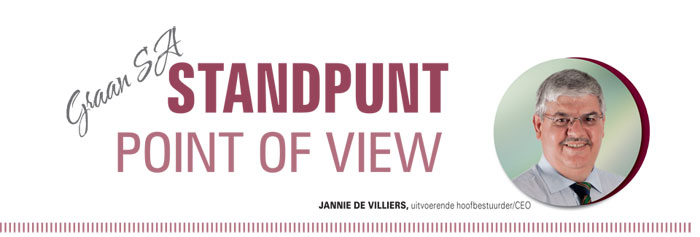July 2014

JANNIE DE VILLIERS, uitvoerende hoofbestuurder/CEO
I think I am beginning to understand something of being a producer when the wind turns west and the grain plants are only about knee high with the sun burning from the sky. Shortly before the election the wind started turning west in Pretoria.
All discussions with the government were either about land reform or black economic empowerment. The negotiators (on both sides) were not open to listening to one another and it was accepted that a lot of the pronouncements and dry west winds would turn into rain showers after the election. My experience is that it is definitely not the case; in fact the winds are blowing far more strongly than before.
The next four years are going to be really strenuous years in Pretoria. Current political goals and the economic realities of agriculture will be very difficult to reconcile. There are clever people who say that one does not learn much from leadership when all goes well, but rather when things go really bad. Now is such a time.
We need the support of all to maintain our energy and focus on the right issues. On television, just the other day, the Minister of Rural Development and Land Reform already remarked that land issues have moved from a race-driven basis to a class-driven basis. If white and black producers say the same thing to government: “We cannot give away 50% of our farms to our workers for free!” then it is more a case of rich versus poor and not white versus black.
Whatever the case may be, there is no way we can separate political goals from economic realities. I am asking myself whether the minister has already discussed his recommendations with his colleague from the Treasury?
There is no way that South Africa (right in the midst of a recession) can afford to destroy the agricultural sector. Food security is the single most important matter that can bring a government to a fall – literally overnight. I can think about quite a number of people in parliament licking their lips at the prospect of a day when there is not enough food left in the grain silos.
For me, the question remains: “What should we do now?” To blame one another and pelt each other with rocks will not help. In February 2014, Grain SA gathered together a number of leading producers to ponder whether it might somehow be possible to pull a rabbit from the hat that could solve the land reform problem.
Sure, there were many plans, but the so called silver bullet evaded us. I cannot but think that the only solution is going to be bad for all parties. It is two parties, of which the one has all the political power and the other all the economic power. True leadership might prevent that we do not destroy both in the process thereby leaving just a battlefield for our children.
This situation takes me back to a day on the bank of the Harts River in 1982. There was a flood and a tractor with a trailer carrying a number of farm workers had been washed away in the flood. This lieutenant and his troops had to patrol the muddy river bank for possible survivors. The first person we found was caught in a tree halfway into the river.
Everybody saw it and flocked together at the river’s edge, but nobody jumped in. Everyone was looking around offering advice, but nobody did anything until the lieutenant started undressing and jumped into the river.
The time has come for our new and old agricultural leaders to show their hands and start addressing the matter for the sake of the future for all of us. Let us support them and pray that they may receive the wisdom and responsibility to resolve the issues.
Publication: July 2014
Section: Features